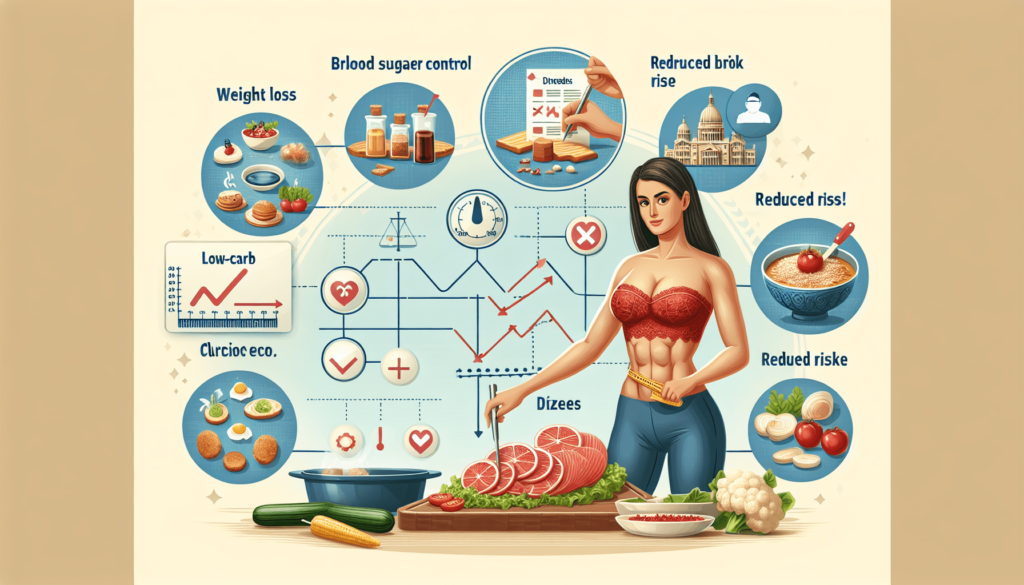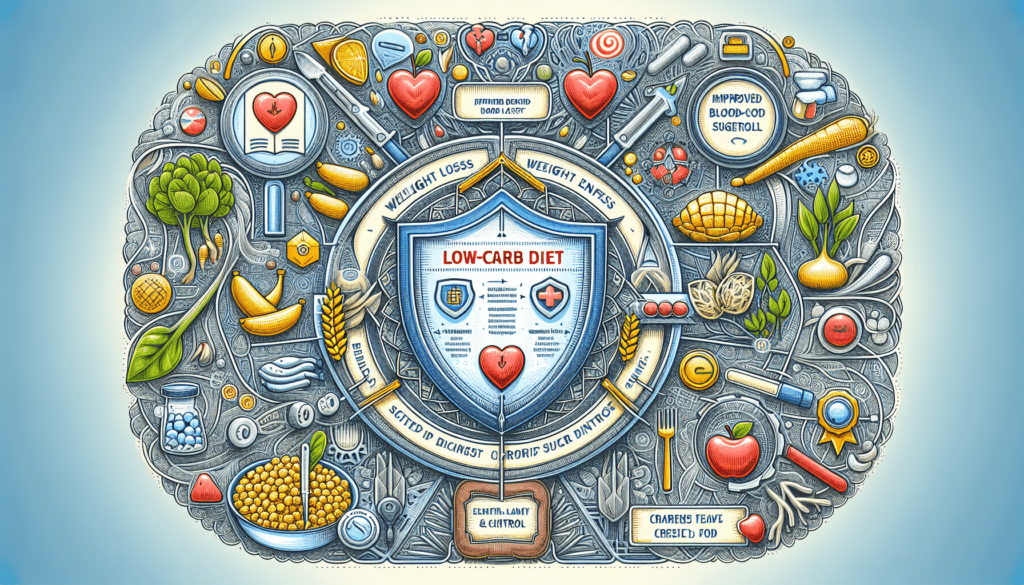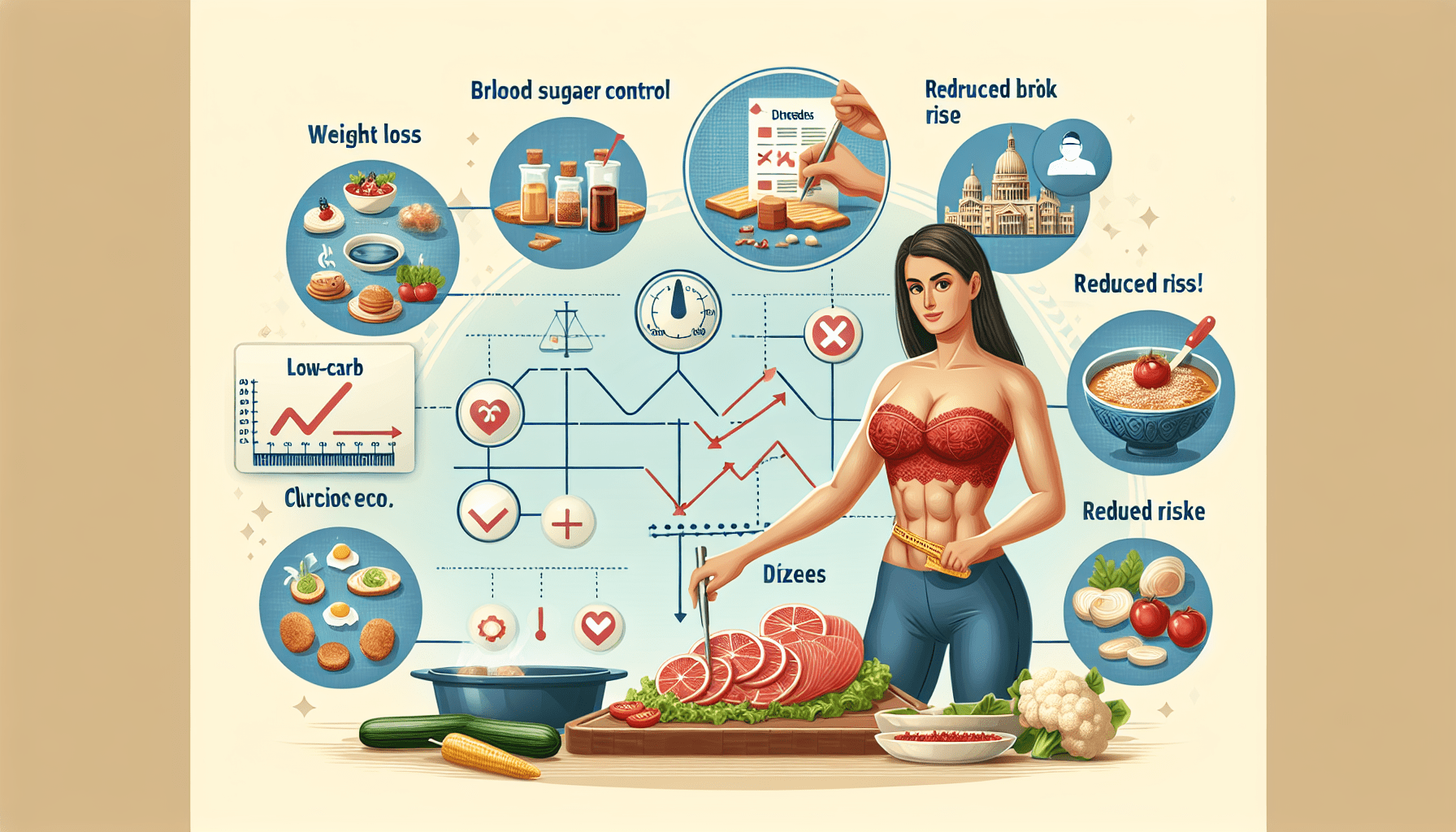Are you looking to shed a few extra pounds or improve your overall health? Look no further than the benefits of a low-carb diet. Cutting back on carbohydrates has been shown to not only aid in weight loss, but also improve blood sugar control and reduce the risk of heart disease. By reducing your intake of bread, pasta, and sugary treats, you can experience increased energy levels, improved mental clarity, and a decrease in cravings. Say goodbye to those mid-afternoon crashes and hello to a healthier, happier you with the many benefits of a low-carb diet.
Weight Loss
A low-carb diet can be an effective tool for weight loss. By reducing your calorie intake, you create a calorie deficit that can lead to shedding those extra pounds. When you consume fewer carbohydrates, your body turns to its fat stores for energy, increasing fat burning and helping you slim down. Additionally, a low-carb diet can lead to a decrease in water weight, which is especially beneficial when you’re looking to lose weight quickly. Furthermore, one of the areas where a low-carb diet can have a significant impact is in reducing abdominal fat, which is often associated with a higher risk of health problems.
Blood Sugar Control
Maintaining stable blood sugar levels is crucial for overall health, especially for individuals with diabetes or insulin resistance. A low-carb diet can help stabilize blood sugar levels by reducing the intake of carbohydrates that cause spikes in blood sugar. By limiting carbohydrate consumption, you can also reduce insulin resistance, making it easier for your body to process glucose effectively. For individuals with diabetes, a low-carb diet may help manage the condition and improve glycemic control, leading to better overall blood sugar management.

Improved Heart Health
A low-carb diet has numerous benefits for heart health. It has been found to lower cholesterol levels, particularly decreasing levels of LDL (low-density lipoprotein) cholesterol, also known as “bad” cholesterol. On the other hand, it increases levels of HDL (high-density lipoprotein) cholesterol, which is known as “good” cholesterol. By reducing triglycerides, a type of fat that can contribute to heart disease, a low-carb diet helps improve blood lipid profile and promotes a healthier heart. Moreover, it has been shown to have a positive impact on blood pressure, another important factor in maintaining heart health.
Reduced Hunger and Cravings
One of the key benefits of a low-carb diet is its ability to reduce hunger and cravings. By increasing satiety, or the feeling of fullness, a low-carb diet can help you feel satisfied with smaller portions and reduce the temptation to snack between meals. It also regulates appetite hormones, such as ghrelin and leptin, which play a role in hunger and fullness signals. By balancing these hormones, a low-carb diet can help control food intake and prevent overeating. Additionally, emotional eating, often triggered by stress or other emotional factors, can be minimized with a low-carb approach, allowing for better control over food choices.

Increased Energy Levels
Maintaining steady energy levels is essential for optimal daily functioning. A low-carb diet can provide a steady release of energy throughout the day by managing blood sugar levels. When you consume carbohydrates, your blood sugar levels can spike and then crash, leading to energy fluctuations and feelings of fatigue. By reducing carbohydrates and relying on fat as the primary source of fuel, a low-carb diet helps stabilize blood sugar levels, ensuring a consistent supply of energy. This can lead to improved mental clarity, better focus, and enhanced physical performance.
Improved Mental Health
In addition to its physical benefits, a low-carb diet can have positive effects on mental health. Studies have shown that reducing carbohydrates can help reduce symptoms of depression and improve overall mood and well-being. The stabilization of blood sugar levels achieved through a low-carb diet can enhance cognitive function and reduce brain fog, allowing for better mental clarity and focus. By fueling the brain with a consistent source of energy, a low-carb diet can support positive mental health outcomes and promote overall well-being.
Better Digestive Health
Digestive health plays a crucial role in overall well-being, and a low-carb diet can contribute to improved digestive health. By reducing carbohydrate intake, you can reduce bloating and gas, which are common symptoms of carbohydrate intolerance. Additionally, a low-carb diet can improve bowel regularity, preventing issues such as constipation. For individuals with irritable bowel syndrome (IBS), a low-carb diet may alleviate symptoms and provide relief. Furthermore, a low-carb diet promotes the growth of a healthy gut bacteria, which is important for optimal digestion and absorption of nutrients.
Lower Risk of Chronic Diseases
Following a low-carb diet can significantly reduce the risk of developing chronic diseases. By reducing the risk of type 2 diabetes, this dietary approach can help maintain healthy blood sugar levels and insulin sensitivity. Moreover, it has been associated with a lower risk of metabolic syndrome, a cluster of conditions that increases the risk of heart disease, stroke, and type 2 diabetes. Additionally, a low-carb diet may decrease the risk of certain types of cancers, such as colorectal cancer. Overall, adopting a low-carb diet can improve markers of cardiovascular health, such as cholesterol levels and blood pressure, reducing the risk of heart disease.
Improved Skin Health
Your diet can have a significant impact on the health and appearance of your skin, and a low-carb diet is no exception. The reduction of high glycemic carbohydrates in a low-carb approach can help reduce acne breakouts by preventing insulin spikes that may contribute to inflammation. By promoting a healthier complexion, a low-carb diet can enhance the overall appearance of your skin. Furthermore, it may alleviate symptoms of conditions such as eczema, which can be triggered by the consumption of certain carbohydrates. Additionally, by reducing oxidative stress and inflammation, a low-carb diet can decrease signs of aging and support youthful-looking skin.
Sustainable and Flexible
One of the key advantages of a low-carb diet is its sustainability and flexibility. Unlike restrictive diets that require strict calorie counting or eliminate entire food groups, a low-carb approach offers a wide variety of food choices. You can adapt a low-carb diet to your personal preferences and taste preferences while still achieving the desired benefits. By focusing on choosing whole, nutrient-dense foods and reducing carbohydrates, you can create a sustainable eating pattern that can be followed long-term. This flexibility makes it easier to stick to and maintain a healthy lifestyle without feeling deprived or restricted.

